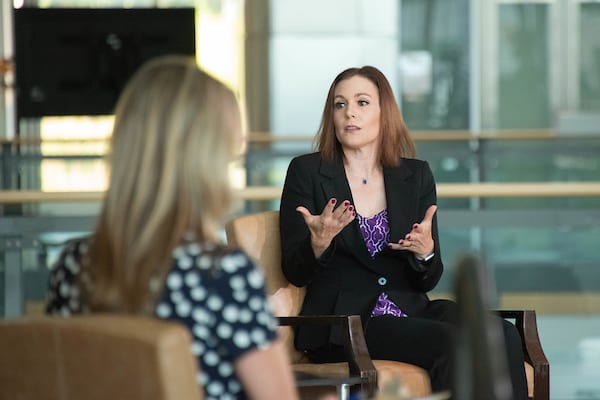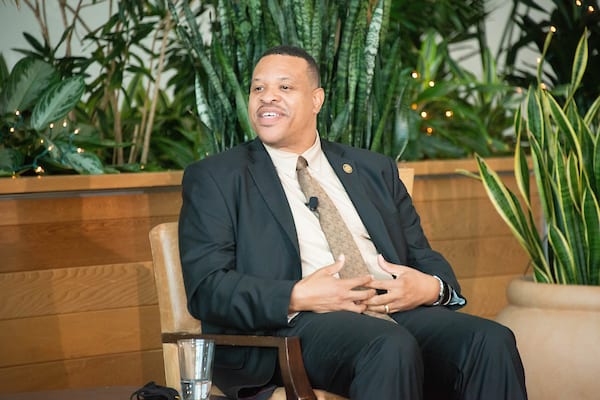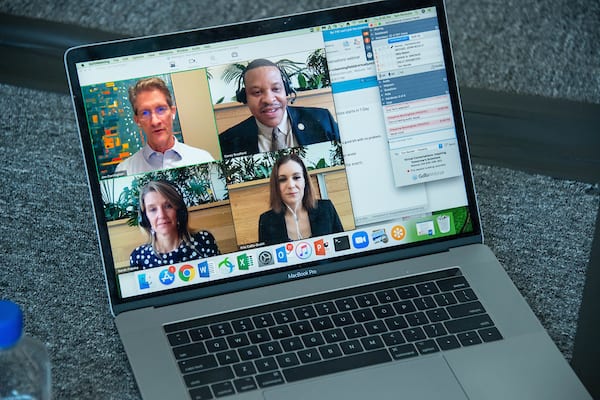Experts Discuss the State of Education at the Danforth Center’s First Online Conversations Event
On August 20, people from all over the world came together for the Donald Danforth Plant Science Center’s first-ever virtual Conversations event. Each year, the Center provides an opportunity for the public to hear experts and leaders discuss important issues of the day. Owing to the COVID-19 pandemic, this year marks the first time the event was conducted online. It was fitting then, that the main topics of the night were the future of education and the impact of online learning.
As schools are re-opening across the country, people are concerned about how students will be impacted and what can be done to ensure their safety and their education. The event, titled “Inspiring Tomorrow’s Scientists,” offered insights into the current state of education from two experts in the field.
Streaming live from the McDonnell Atrium with speakers seated six feet apart, St. Louis Public Radio’s Sarah Fenske began by introducing the night’s guests: Dr. Corey S. Bradford, president of Harris-Stowe State University and Kristine Callis-Duehl, PhD, the Sally and Derick Driemeyer director of education research and outreach at the Danforth Center.

Kris Callis-Duehl speaking at our virtual Conversations event.
The Virtual World
While the panelists agreed that virtual classrooms cannot fully replace real ones, they believe that a quality education is possible through online learning, but only if educators know how to properly utilize it. In one of her surveys of students and faculty from around the world, Dr. Callis-Duehl noted that when teachers were already knowledgeable on how to teach efficiently in a virtual setting, their students reported higher levels of happiness. Unfortunately, 40% of the faculty they surveyed had no prior training in online teaching, and as a result their students felt they didn’t get as much out of online classroom experience.
If given the right set of tools, students can learn in any environment. What’s most important is the sense of belonging. If they feel they belong, they will persist even if things get difficult.
Kris Callis-Duehl, Phd Sally and Derick Driemeyer Director of Education Research and Outreach

Dr. Corey S. Bradford speaking at our virtual Conversations event.
Barriers
While both speakers stressed the importance for students to continue their education, they also agreed there are numerous challenges students face in trying to gain access to it, particularly when they come from low-income households. Dr. Bradford and the Harris-Stowe faculty worked to provide devices and Wi-Fi hotspots to those who needed them, but as Dr. Callis-Duehl added, “There are other barriers beside the device.” Many people don’t have consistent power to use such devices, and the parents of younger students can’t be around all day to assist them with the technology.
The panelists noted that these disparities have always existed at all levels of education. The pandemic has simply brought them to light in a new way, along with other long-standing inequalities. As Dr. Bradford mentioned, African American communities have been hit especially hard by the virus and are under a great amount of stress and anxiety. “We know these differences exist,” Dr. Bradford said. “The only way to address them is by working together as a community.”

Jim Carrington, PhD, president of the Danforth Center, led a Q&A session with Sarah Fenske, Kris Callis-Duehl, and Dr. Bradford.
Finding a Way
While there is no overnight solution for these larger systemic issues, everyone can make a difference just by being more understanding. “We need to be flexible in order to provide the quality education our students deserve,” Dr. Bradford said, and Dr. Callis-Duehl made some recommendations. For example, if a student has inconsistent internet access and is unable to attend class with their peers, she recommended that teachers allow them to instead watch a recording of the class later. In regards to K-12 education, she also called for leaders in the business world to realize that “The people who work for you are parents who are becoming teachers,” and to work with them to accommodate their new schedules.
Why It Matters
The Danforth Center is a non-profit dedicated to improving the human condition through plant science. We carry out this mission in many ways, improving crops to feed the world and improve human health, while providing educational opportunities for students in our region. We are supported through the charitable giving of people like you. If you’d like to support the work of the Danforth Center, click here to make a donation today.
Watch the Event
Media Sponsorship by


For information on sponsoring virtual Conversations, contact Director of Corporate and Foundation Relations Brian Russell at 314.587.1074 or via email to brussell@danforthcenter.org.